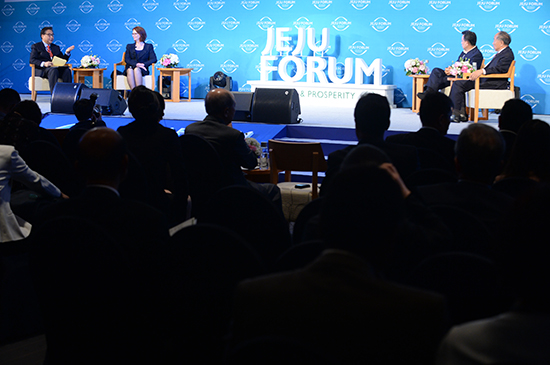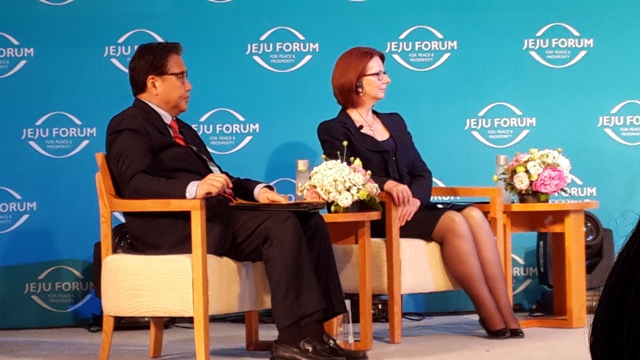| |
 |
|
| ▲ The Jeju Forum World Leaders Session included Julia Gillard, former prime minister of Australia, Li Zhaoxing, former foreign minister of China and Han Seung-soo, former prime minister of the Republic of Korea. Photo courtesy Jeju Sori |
What does it mean to reconceptualize a global region?
"Designing New Asia," the theme of this year's Jeju Forum for Peace and Prosperity, engenders thoughts of regeneration, renewal, reorganization, restructuring, reframing. In Northeast Asia, the particular focus of the Jeju Forum structure, with its ancient civilizations and a long history of conflict - and, long memory of same, this is a very delicate business.
The World Leaders Session of Jeju Forum follows the Opening Ceremony, in which two present or former high-level government officials deliver keynote speeches, and provides them with an opportunity to explore and expand upon the concepts they presented.
This year's World Leaders' Session included Julia Gillard, former prime minister of Australia and current chairperson of Global Partnership for Education; Li Zhaoxing, former foreign minister of China and current president of Chinese Public Diplomacy Association; and, Han Seung-soo, former prime minister of the Republic of Korea and current special envoy for the UN Secretary-General. The session was moderated by Park Jin, former chairman of Korea's Foreign Affairs and Unification Committee, and current executive president of Asia Future Institute. Park previously served three terms as a member of the National Assembly.
Gillard spoke of a history of strong ties between South Korea and Australia, outlining the soldiers sent by Australia to fight in the Korean War, a more recent white paper produced by the Australian government which addressed growing economic ties between the two nations and human security issues in the Korean peninsula, and her state visit with Korean President Park Geun-hye, ultimately describing her country as "a dependable friend."
She outlined a three-fold focus in the relationship between her country and Korea: the threat represented by North Korea and possible solutions; the consequences and meaning of China's economic and military rise; and, the engagement of the U.S. in this region as an ally.
Gillard also spoke of the unresolved "comfort women" issue between Korea and Japan, in which Korean women were made to serve as sex slaves to the Japanese military during the early-20th century colonization of Korea. Expressing strong sympathy and support, the need for recognizing past suffering and to never forget such atrocities in order that they are not repeated, she then emphasized the need for resolution in order to increase human security in the region.
"The world would be grateful to see a move forward by Korea and Japan [on this matter]," she exhorted. She further echoed the words of U.S. president Barack Obama, on his recent visit to Korea, by saying, "All of the tensions in this region can be managed."
| |
 |
|
| ▲ Gillard expressed support for recognizing past suffering in Northeast Asian and she emphasized the need for resolution in order to increase human security in the region. Photo by Anne Hilty |
Li was asked by the moderator about the rebalancing of the China - U.S. relationship by new policy. He described a methodical approach, and said that his country had "never sacrificed the interests of neighboring countries nor invaded others."
"China is a peace-loving country," he furthered, "achieving its progress and development by peaceful methods -- a very different approach from that of Western nations."
When asked about various regional disputes, in particular those regarding islands in the South Sea, he further referred to the UN charter under which all countries are equal and by which the UN may not interfere in the internal affairs of its member nations.
"Asian nations must pursue common interest for prosperity, and must therefore be at peace with each other," he stated. "But we should be wary of a third party entering the situation. Nobody welcomes third-party intervention [in a conflict]," he continued.
Remarking on earlier comments by others that America was "making a comeback in East Asia," he replied that he had to wonder about that phrase -- as, in his observation, the U.S. had never left the region in the first place.
Han echoed the opinions of Li in saying that, while the European Union provides a "shining example" of reconciliation and peace for the sake of both human security and shared economic interests, "EU-style reconciliation at the moment seems far away for East Asia."
Proposing "One Asia" that stems from a uniquely "Asian model" for same, he said, "Asian nations have to work very hard, not only for prosperity but to be responsible for a peaceful region."
Also discussed were environmental issues. Gillard pointed out that her country is at the forefront of environmental protection, in a leading position and as a model to others. During her term, she initiated a tax on carbon production in order to encourage clean energy.
Han, in referring to the UN secretary-general Ban Ki-moon's recent call for climate change intervention, identified water-related issues as a main component of the Post 2015 Agenda, a topic that was not addressed in the original UN Millennium Development Goals.
"Many governments spend too much money on military and disaster prevention," he stated, suggesting that environmental concerns and particularly that of access to clean water were vital.
The session concluded with Li's mention of President Park Geun-hye's recent state visit to China, and the upcoming visit of Chinese president Xi Jinping to South Korea for a summit with President Park, scheduled for June. He identified regional security, in particular the role of China in the denuclearization of North Korea, as focal points.
"President Park's visit to China was very successful," he said, stating that her "deep understanding of Chinese literature impressed the people very much."
"Korea - China relations are at a very good point today," Li concluded, "and although our diplomatic relations were only recently renewed, they have moved quickly -- and we have good hope for the future."
|





















